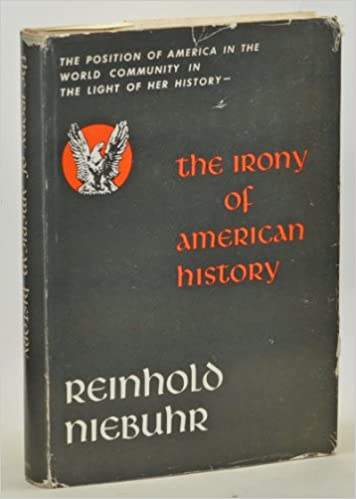If men or nations do evil in a good cause; if they cover themselves with guilt in order to fulfill some high responsibility; or if they sacrifice some high value for the sake of a higher or equal one they make a tragic choice.-Reinhold Niebuhr, The Irony of American History
When Protestant theologian Reinhold Niebuhr posited the tragic choice of evil for the sake of good – a choice inherent in both the “human condition” and the anarchic state of nations – he was not focused on differences within a specific national government. Today, however, in the dissembling United States, a similarly tragic choice confronts America’s citizens in particular. Here the apparent choice is bold and straightforward:
Shall Americans support an evil president in the greater interest of some wider political good?
Though plausible in principle, no such dilemma actually exists. In current US political circumstances, there is no supportable argument that Donald Trump’s disjointed and seat-of-the-pants policies, either foreign or domestic, can bestow any verifiable net benefits. To the main point, by allowing a willfully corrosive president to act in its name, the United States has defiled American national interests and global human interests simultaneously.
Apropos of proper logic, one presumptive conclusion is unambiguous: There is no “tragic” choice involved here (the choice identified above by Realpolitiker Reinhold Niebuhr), just an obvious and overriding imperative to rid both nation and planet of Trump-era toxicity. Prima facie, in this case at least, presidential evil and American good are mutually exclusive.
There is more. With each passing day, weary Americans must face several stark and ironic contradictions. At an historical moment when uplifting numbers of good people are making great personal sacrifices to help others (e.g., medical communities working against Covid19; firefighters in the west; hurricane search-and-rescue personnel in the south, etc.), a US president acts wittingly to undermine his own country’s safety and security. This behavior includes a continuously incomprehensible stance of support for Vladimir Putin, the Russian president who it would appear can wish no harms upon the United States.
While according to any reasonable criteria of intellectual assessment these cumulative Trump behaviors are injurious and inexcusable, millions of US citizens still maintain that his plainly deranged presidency represents a calculable “net positive.”
What does this really mean? By definition, even now, these Trump-supporting Americans believe that manifest presidential evil can be compatible with national welfare and national progress. Somehow, in this case, they believe that such once-unimaginable evil can also be good. Credo quia absurdum, said the ancient philosophers, “I believe because it is absurd.”
How can all this be helpfully explained? Conceptually, it would be best to begin at the beginning. The contradiction we are so painfully witnessing with this stumbling White House administration is not uniquely American. Already, back in the sixteenth-century, philosopher Niccolo Machiavelli observed famously, “A man who wishes to make a profession of goodness in everything must necessarily come to grief among so many who are not good.”
Machiavelli need not always be clarifying or relevant. There is nothing here to suggest that this classic argument from The Prince would in any way support Donald J. Trump’s foreign and/or domestic policies. This president’s particular descents into wrongdoing and dereliction are not an expression of any gainful policy “realism.” Rather, they are singularly lamentable expressions of wantonly gratuitous harms.
In an unsteady age when the risks of a nuclear war could coincide with expanding biological destructions – that is, with the devastating microbial assaults of a Corona-Virus “plague” – such harms can have no conceivable justifications.
None at all.
There is more. Context is important. All humans, wherever they may live, must bear persistent witness to the distressingly thin veneers of “civilization.” Recalling William Golding’s marooned boys in Lord of the Flies, we must repeatedly discover, beneath any delicate varnish of supposed coexistence, a lascivious human inclination to brutalize certain “others.”
However informally it may be calculated, this primal inclination is “normally” judged agreeable and cost-effective.
Science and technology notwithstanding, empathy and compassion remain in calculably short supply on planet earth. Accordingly, substantial fractions of humankind remain slouched in perpetually bruising darkness, hoping not to create promising new forms of human civilization, but to “better” inflict myriad varieties of unspeakable slaughter. During the debilitating “Trump Years,” years of steadily-expanding presidential evil, the United States has made an egregious choice.
Knowingly, it has placed itself directly within such nefariously cascading “darkness.”
As “analysts,” Americans should now be more policy-specific. In Donald Trump’s United States, there is always some blatantly self-serving presidential explanation for human rights abuse. To wit, we are instructed, the latest victims are despicable, “illegal” or, in some ways at least, not fully human. Always, they are “others,” mere others. And as we are repeatedly informed by the president’s reliably obsequious minions, this particular victim population is not at all like us. It is deserving of necessary “punishment.”
Credo quia absurdum. “I believe because it is absurd.” It is a very old story. The struggle between “Us and Them” is very plainly generic, not US-specific. If we are “good,” they are not. Period. Such grimly bifurcated reasoning is especially perverse and ironic today, during a pandemic crisis when the common biological “oneness” of the human species couldn’t possibly be more obvious
In high tragedy, as originally performed back in fifth-century BC Athens, humans were routinely presented as inherently flawed guests in a divinely-created universe. This ancient presentation, though presently “modified” with assorted regional and religious nuances, remains difficult to dispute. After all, following even a “small” nuclear war – a plausible event, at least in the currently downward trajectory of world affairs – cemeteries the size of whole cities could be needed to bury the uncountable dead.
Then, recalling the pre-nuclear imagery of poet T S Eliot, there could be no “lilacs breeding out of the dead land.” Then, there would be no discernible “good,” only variously decaying bearers of “evil.”
Promptly, in far-flung parts of the world, both within and between individual nation-states, a “waste land” could become the new normal. Such “normalcy,” one substantially worse than even the new-normal of Covid19 life on earth, ought never become an intentionally sought-after expectation. For rational thinkers, this point hardly requires any present-moment clarifications.
No sane person can be in favor of necropolis.
“Art is a lie,” noted Pablo Picasso, “that lets us see the truth.” In this paradoxical description, theatrical tragedy can remind us that earthly spheres of order, justice, and good remain severely compromised by evil, and that no amount of technology or science can ever compensate for our species’ multiple leadership transgressions. If, as in high tragedy, we humans should sometimes be punished in apparent excess of our specifically personal wrongdoings – “Whom God wishes to destroy,” warned the Greek tragedian, Euripides, “He first makes mad.” – even this “unfair” fate could not declare us to be “innocent.”
Not reasonably.
There is more. Always, it is the gripping silence and self-inflicted fears of ordinary people that sustain the human world’s abundant madness. Often, these primal fears center on certain irrepressible expectations of personal death. But sometimes they can also rest on various corollary anxieties about personal exclusion. More than anything else, and for several markedly different yet intersecting reasons, we humans continue to seek the comfortingly calming warmth of “mass.”
It is the “mass man.” an elucidating and derivative construct of Spanish existentialist philosopher Jose Ortega y’Gasset (The Revolt of the Masses,1930) who created US President Donald J. Trump. Stated differently, this American president, who promises to “Make America Great Again” is the openly evil product of American “mass.” By itself, this collective does not intend to create evil, but intent is not at all determinative.
It is quite enough that the mass prefers baseless opinion to documented fact and a willful anti-Reason to proper learning or tangible science.
There is more. As a species, not just as Americans, there exists no compelling or defensible reason for us to fawn upon myriad past mistakes. Now, instead, with a view to achieving some still-plausible and verifiable progress, Americans must look back courageously. “How much treasure,” they must finally inquire, “how much science, how much labor and planning, how many vast oceans of sacred poetry, have we already ransacked, just to render our disparate human civilizations even more miserable and more imperiled?”
I don’t know each pertinent answer. I do know, however, that our shallow and corrupted civilizational institutions, including America’s humiliating presidential elections, can never save us. This nation’s most revered universities, perched deliberately above the distressingly mundane clamor of work, politics and family, remain unmindful of the world’s most urgently important intellectual questions.
Thoroughly unmindful.
Unassailably, though painfully indelicate to acknowledge, higher education in the expansively deranged Trump-Era proceeds hand in hand with a ubiquitously crude and predatory commerce. In partial consequence, our colleges and universities shamelessly crush most residual reflexes of lingering student intellect or individuality. This crushing is not undertaken with any insidious intent – and the challenges to academic success during a pandemic are anything but minor – but the US posture of anti-Reason is nonetheless destructive. Sorely destructive.
In today’s Trump-defiled United States, American Transcendentalist philosopher Ralph Waldo Emerson’s once venerable goal of a people that is “plain living and high thinking” is more than just forgotten. This once-lofty objective presently now lies very far beyond any identifiable popular interest or hint of public imagination. Why not? Living together with unhidden presidential evil, what else should we expect?
The American University, a dutifully obliging adjunct of the wider corporate/political universe, now lies distant not only from human learning but also from human survival. French philosophers of the eighteenth-century Age of Reason had preferred to speak optimistically of a siècle des lumieres, a “century of light,” but today, the ivy-covered walls are inestimably fouled by congealing darkness, by a suffocating pall of excruciating conformance, vulgar self-interest and even a peculiarly-fashionable loathing of anything detached from money.
There is a professionally favored euphemism here. It’s called “wealth maximization.” The language provides cover for a nation’s abject indifference to serious learning.
None of this devaluation was initially created by the Trump “ascendancy,” but it has been strongly reaffirmed in absolutely every respect by a starkly unworthy American president.
As an easily verifiable matter of human history, resisting evil has had little to do with human intelligence. More often than we may care to admit, such intelligence is conveniently manipulated to justify or enlarge certain “others’” most excruciating forms of human suffering. Indeed, looking over the still-mounting wreckage of Donald Trump’s presidency in the United States, we see the palpably grim results of such manipulation, both domestically and in various other countries harmed by the dissembling American foreign policies.
In some cases, these are harms of US omission or inaction, rather than of commission. A specific case in point would by Syria, where Trump’s immutable unwillingness to get on the wrong side of Vladimir Putin has already created societal disintegration and unspeakable torment.
The main theme or question before us allows only a single coherent response. There is no way that a “good” American society can be created or sustained by an “evil” American president. Period. Before the United States allows itself to become even more thoroughly lost to any still credible hopes for human improvement and national survival, American citizens will have to build more purposefully upon this rudimentary wisdom. To be sure, we remain disturbingly far from understanding (let alone electing) Plato’s “Philosopher King,” but now we are at least better advised to reject American presidential evil at absolutely all costs.
Donald J. Trump does no evil for the sake of good. There is nothing “tragic” about his persistent across-the-board choice of evil postures and policies. In essence, he makes these barbarous choices because he is authentically committed to evil for evil’s own sake.
Left uncorrected, Trump will continue to bring to these deeply unhappy United States a self-inflicted future of national humiliation and determined anti-reason.
No such future could ever “make America great again.”
Louis René Beres was educated at Princeton (Ph.D., 1971), and is Emeritus Professor of International Law at Purdue. His twelfth book, Surviving Amid Chaos: Israel’s Nuclear Strategy, was published in 2016. His other writings have been published in Harvard National Security Journal; Yale Global Online; World Politics (Princeton); Bulletin of the Atomic Scientists; Israel Defense; Parameters: Journal of the US Army War College; Special Warfare; Oxford University Press; The Jerusalem Post; Infinity Journal; BESA Perspectives; US News & World Report; The Hill; and The Atlantic.
His Terrorism and Global Security: The Nuclear Threat (Westview, first edition, 1979) was one of the first scholarly books to deal specifically with nuclear
This article was first published in Modern Diplomacy
Read more about: Donald Trump Presidency




